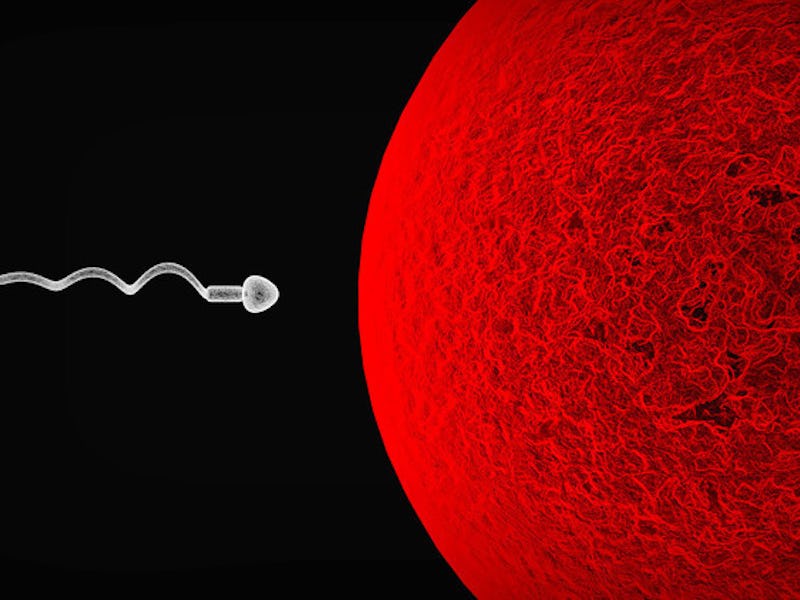Men Have a Biological Clock Too, and Scientists Say It Starts Ticking Early
Sperm banking for dads who put kids on hold may become a "societal responsibility."

It turns out women may not be the only ones with biological clocks. Women looking to have families are already aware of their internal egg timer that counts down the best biological time to have a child, but now, research from a team at Rutgers University shows that men also have to contend with time. After a certain age, changes to dad’s sperm can have lasting impacts on future generations. And at a certain point, it may be worth creating a frozen backup supply.
In the paper, published in the journal Maturitas on Sunday, Gloria Bachmann, M.D., the director of Rutger’s Women’s Health Institute, set out to review the evidence on how “advanced paternal age” affects the health of children. Crucially, the threshold for “advanced paternal age” is pretty subjective. Some studies place the cutoff as low as 35, but the American Society of Reproductive Medicine, the authors note, say that “advanced” age is 40 and older for fathers.
Regardless, Bachmann’s paper rounds up a handful of powerful studies to prove that after a certain age, women and men should be thinking about their “biological clocks” for the good of their partners and the health of their kids.
“Men, too,” the authors write, “need to recognize their clicking biological clock. Sperm banking for men who are delaying childbearing may need to be part of our societal responsibility commencing in the nearby future.”
As men get older, changes to their sperm may create complications during pregnancy or have effects on offspring.
As examples, Bachmann points to several population-based studies that highlights some of the complications older fathers might face. For example, a study following over 40 million parents for 10 years published in The BMJ in 2018 found that delaying fatherhood is associated with more risks during pregnancy. Partners of fathers over 45 years old, that study found, were 28 percent more likely to develop gestational diabetes than those with partners between 25 and 34, even after adjusting for the mother’s age. Another paper, published in the American Journal of Men’s Health in 2012, noted that children born to fathers aged 40 to 45 had a 24 percent greater risk of being stillborn compared to children born to younger fathers.
"Men too need to recognize their clicking biological clock.”
Bachmann also presents evidence that “advanced paternal age” is linked to more lasting changes in their future kids. For example, she notes that a 2014 study in Schizophrenia Bulletin found that children born to fathers of 45 tended to have higher a risk of schizophrenia.
She argues that the results of all these studies, and the countless more than she cites, can in part be traced back to changes in sperm that happen as a father gets older. We already have evidence that lifestyle changes affect sperm. For example, poor diet or exercise have both been shown to impact microRNAs, tiny payloads of genetic material carried in sperm, which, in turn, influence the genes of future generations.
Freezing sperm may be a way to avoid the problems associated with fathering children at "advanced" age, but doctors can't agree what "advanced" means.
Bachman argues that aging also impacts sperm quality in a way that can affect the health of a future kid, though there’s not a single explanation for why. “In addition to advancing paternal age being associated with an increased risk of male infertility, there appears to be other adverse changes that may occur to the sperm with aging,” she said on Sunday.
But where we draw that age cutoff is still up for debate. Most of the studies she reviewed suggest that things go downhill after 45, though she still suggests that fathers should at least start thinking about their biological clocks around 35. One way to start, she argues, is by considering freezing some backup sperm the same way women might think about freezing their eggs — a trend sometimes called panic parenting. Freezing more youthful sperm, she adds, may head off some of the complications at the pass, but only if we can really nail down an age recommendation.
“Medical society consensus as to the age of advanced parental age would help in determining the paternal age at which sperm banking should be commenced,” she writes. In other words, recommending sperm banking between 35 and 45 just isn’t specific enough right now.
But considering the fact that sperm freezing is getting easier and easier, it might not a be a bad move — just in case.
Abstract:
The increasing maternal age at first birth is well recognized, but much less discussed are the fact that the prevalence of advanced paternal age (APA) is also increasing and the societal implications of this trend. Over the past 40 years in the United States, the proportion of infants born to fathers of APA, which has been variably defined as above 35 or above 45, increased from ˜4% to 10% (Khandwala et al., 2017, 2018) While there has been extensive research regarding infertility and comorbidities in the aging mother, relatively few studies have explored similar reproductive factors in aging men. However, evidence does suggest a decrease in fertility and an increase in pregnancy complications such as gestational diabetes, intrauterine growth restriction and preterm birth. Additionally, the offspring of fathers of APA have increased risks of chromosomal and non-chromosomal birth defects and an increased incidence of childhood autism and cancers. This review explores the data, with the intent that key counseling points, including the suggestion of sperm banking, can be highlighted when advising the midlife and older man who is considering paternity.